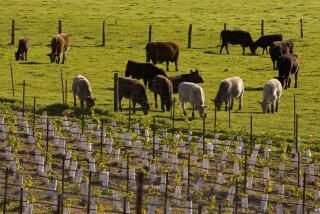No consensus from state panel on farmers market enforcement
SACRAMENTO -- More than two years after reports of widespread cheating at farmers markets, the latest state group designated to solve the problem has ended its sessions without reaching a decision about crucial enforcement issues, though it may have made enough progress to help spark legislative interest.
California Department of Food and Agriculture officials and farmers market subcommittee members, who invested much effort in the process, were clearly frustrated by the lack of consensus regarding farmers market enforcement.
“It’s been discussed to death,” said Steve Patton CDFA branch chief for inspection and compliance. “Now it’s up to the industry to make a decision as to the source and level of funding.”
“There just wasn’t enough time to fully wrangle the unwieldy 30-plus years of regulations and entrenched views regarding certified farmers markets,” said Amelia Saltsman, the public representative on the committee. “I hope that as the process moves forward, legislators will have the opportunity to hear what actual farmers market patrons and small producers want.”
The latest group, called the Direct Marketing Ad Hoc Committee, was appointed 10 months ago by the CDFA, and met for the last time on Sept. 13 in Sacramento. It was intended to expand the work of a previous Technical Planning Committee whose proposal to boost funding for farmers market enforcement did not go anywhere because market participants couldn’t agree about increasing the stall fees paid by farmers to the state.
To try to build consensus, the CDFA brought in a broader range of 24 participants, including regulators, market managers, nonprofit officers and even one farmer. It also broadened the scope of the discussion to include other forms of direct marketing such as farm stands and community supported agriculture (CSA). These have grown significantly in recent years, but compared to farmers markets, they have not been regulated as systematically, either to protect public health, or to make the origin of their produce clear to consumers.
The Direct Marketing committee addressed these topics in subcommittees, along with related issues such as the role of community gardens, improving access to fresh produce in underserved areas, and promoting food banks. But this group did not vote on any specific recommendations on any of these matters and much of its report consists only of “considerations” -- basically possible courses of action to be considered later.
The subcommittee for CSAs made the most progress, perhaps because this is a new regulatory arena in which factions have not yet become entrenched. In order to make sure consumers know where the produce in CSA boxes originates, the group suggested defining two classes of CSAs, single-farm and multiple-farm; it also devised a broader category, California-Grown, which allows produce sourced from any “registered direct marketing producers.”
Much of the CSA discussion was driven by food safety concerns, to ensure uniform regulation statewide. The degree of regulation of CSAs would depend on their classification and whether they are distributing just produce, relatively safe foods like jams, or potentially hazardous foods like meats.
The CSA subcommittee’s chair, Dave Runsten of the Community Alliance With Family Farmers said that he expects to see a bill defining CSAs introduced in the State Senate by the end of the year.
Regarding farmers market enforcement, the draft report contained mostly general principles, not detailed plans. A much-discussed proposal to bar non-California produce from the non-agricultural sections of certified farmers markets was not included but is likely to be in the final report. This document, which will include final comments by committee members, will be posted on a CDFA Inspection Services web page in about a month.
At a previous meeting of the Certified Farmers Market Advisory Board in March, CDFA’s Patton had said that the department would soon be hiring a full-time enforcement official for the farmers market program. But at the most recent meeting in Sacramento, he said that this had not happened because of the uncertainty regarding how the farmers market industry wanted to fund and structure enforcement.
A hearing of the Senate Select Committee on California Food will allow interested parties to testify and seek sponsors for proposed legislation. It will take place Oct. 15 at 1:30 p.m. at Santa Rosa City Hall, 100 Santa Rosa Ave., and will be open to the public.
***
The South Pasadena farmers market, whose veteran manager, Greta Dunlap, resigned effective Sept. 13 after differences with the city’s Chamber of Commerce has hired an interim manager, Carole Gallegos. Previously the manager at the Studio City Market, and currently the manager of the Encino venue, she will serve while a committee of farmers and Chamber board members considers applications for the permanent position, for which Gallegos will also be invited to apply, said Chamber CEO Scott Feldmann.
***
Tip of the week: From a cursory glance it’s possible to confuse Mexican-race avocados with eggplants. They’re small, with thin, smooth, glossy dark skin that is surprisingly edible, tasting of anise. Ripening early, from September to November, at a time when it can be difficult to find top-quality local Hass – the old Hass crop is winding down, and the new crop is still several months off – Mexican-race avocados can have high oil content and excellent flavor, and are well worth exploring during their brief season.
Their thin skins make them too perishable for shipment and storage, so they’re mostly available at farmers markets. Many growers such as Rancho Santa Cecilia and J.J.’s Lone Daughter Ranch have a few trees of Mexican-race types like Topa Topa and Mexicola. These varieties are used for rootstock, and sometimes bear fruit when the scion of the grafted variety dies; they are occasionally planted for their fruit. Beylik Family Farms of Fillmore also offers Stewart, an improved variety selected for its fruit quality, at the Hollywood, South Pasadena, Santa Clarita and Santa Monica markets.
More to Read
Eat your way across L.A.
Get our weekly Tasting Notes newsletter for reviews, news and more.
You may occasionally receive promotional content from the Los Angeles Times.






